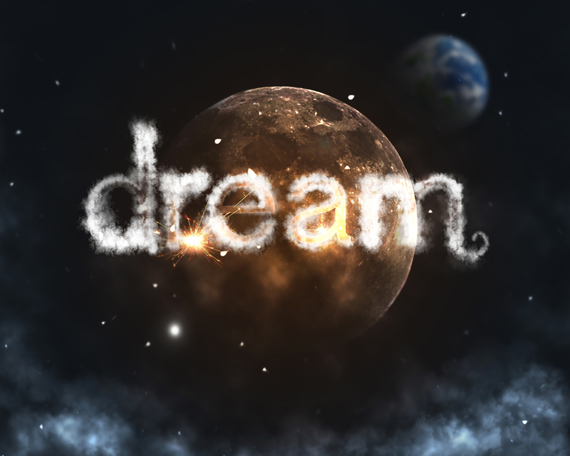By Dr. Angel Morgan via DreamsCloud
I would like to set the record straight: "Dreams" are not always dreams. Everywhere we look in pop culture there is some mention of "dreams." It usually looks like: "Follow Your Dreams," "Make Your Dreams Come True," "Dream Big," "Living The Dream," and of course, "The American Dream." When you are window shopping and see the word "dream" carved into a frame, a candle, engraved on a necklace, or typeset onto a poster, what does it make you think of?
As it turns out, the kinds of "dreams" pop culture generally speaks of are more accurately defined as: hopes, wishes, aspirations, or visions for one's current or future life. Many books with the word "dreams" in the title are actually about manifesting one's hopes, wishes, aspirations and visions by following specific rules such as with The Law of Attraction.
Sometimes, as in Dr. Martin Luther King Jr.'s "I Have a Dream" speech, these hopes and visions for the future can be for more than one person's life. In cases like that, "dreams" can be envisioned for the world as a whole. Although these kinds of "dreams" can happen when we are asleep, usually they happen when we are awake.
There is nothing necessarily wrong with books about hopes, wishes, aspirations, or even manifesting one's visions in my opinion -- especially when their content is helpful to people. But when I find a book that looks great and has the word "dream" or "dreams" in the title, I tend to expect it might be about our experiences during sleep. So when I find out it isn't -- I inevitably feel misled. And no, I am not the only person who feels this way! Several of my colleagues in the field of dream study have been complaining about this for years -- probably because we want more people to know about dreams!
Although our hopes, wishes, aspirations, and visions are also part of dreaming, our experiences during sleep that we call dreams are most often -- unless you are strictly Freudian -- defined quite differently. So although dreams can sometimes resemble or influence "dreams" -- for the purpose of setting the record straight, let's differentiate them as "day dreams" and "night dreams." (You're welcome.)
Night dreams can tell us if we are on the right path, or warn us that we are on the wrong path in waking life. For example, if someone's diet is causing a health problem, she might have a night dream that shows her what the problem is. Night dreams can present the change that needs to be made in order to prevent future health problems, and even help heal current health problems.
Just as our waking lives influence our night dreams, our night dreams also influence our waking lives. People, places and events from waking life appear in our ordinary night dreams, where we can freely explore how we feel about these people, places, and events that are often masked by the use of symbols, puns, and metaphors.
Night dreams bring our feelings out into the forefront so we can get in touch with them. They take us to the root source of our issues, problems, challenges, and victories. That usually has an impact on the way we carry ourselves the next day, whether we remember our dreams consciously or not. Night dreams can make us feel any range of emotion, but whatever it is -- it's synchronized in some way with what's happening in our waking lives at the time.
Since night dreams deal with our deepest feelings, of course we also encounter our hopes, wishes, aspirations and visions for the future in them. Some extraordinary night dreams -- precognitive dreams -- literally or metaphorically show us the future, even though they cannot be confirmed until after the fact.
Lucid night dreaming can give us a certain degree of conscious influence on our night dreams, while we are dreaming. In lucid night dreams, anything we imagine is possible. When we realize all of our needs can be met in lucid night dreams, we can learn how to take care of ourselves there. The ability to transform negatives into positives, and fulfill unmet needs in lucid night dreams can make people less dependent and needy, and more selfless and giving in waking life relationships.
The more consciousness we bring to our lives, and the better we know ourselves, the more able we are to make good decisions that affect our physical, emotional, and mental health. The less consciousness we bring to our lives, the more likely we are to make less healthy decisions for ourselves, and others. When we dedicate ourselves to dream education and self-reflecting on our night dreams, we become more confident and relaxed. This decreases excess stress and anxiety and is great for our overall health.
Yet we wouldn't want to literally "follow" all of our night dreams and we certainly wouldn't want all of our night dreams to "come true" and manifest in waking life! Many night dreams are quite frankly weird to us when we look at them through the lens of waking life conventions -- especially if we haven't yet learned to decode our own mysterious dream language.
Some people have a day dream to learn more about their night dreams. Is that you?
DreamsCloud is a place to log and share your dreams, keep an online dream journal, learn more about dream meanings and receive professional dream reflections. They offer a free app for iOS, Android, Windows and Blackberry devices, in addition to a Facebook app.
About Reflections: DreamsCloud is of the belief that only the dreamers can truly know the meaning of their dream and that no other person can provide definitive dream interpretation. Upon the user's request, Dreams Cloud Reflectors provide insightful feedback, gleaned from years of study in the dreams field, to help the user to better understand their dreams. DreamsCloud reflections are not a substitute for psychotherapy or other professional treatment and should not be used as such.
Blog author Angel Morgan, Ph.D., completed the Dream Studies and Creativity Studies programs at Saybrook University. Her research can be found on academia.edu. Dr. Morgan also oversees the experienced dream reflectors at DreamsCloud, providing feedback and insight for dreams submitted by users worldwide.

